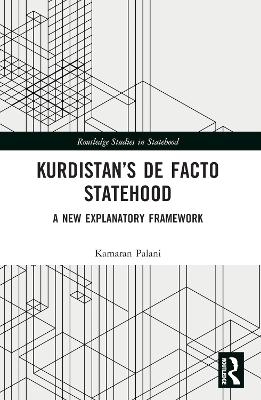
Kurdistan’s De Facto Statehood
A New Explanatory Framework
Seiten
2024
Routledge (Verlag)
978-1-032-26966-5 (ISBN)
Routledge (Verlag)
978-1-032-26966-5 (ISBN)
This book explains the dynamics and nature of Iraqi Kurdistan’s de facto statehood since its inception in 1991, in particular the vicissitudes de facto independence since then.
The work examines de facto statehood in Kurdistan, and uncovers the dynamics of de facto statehood in Kurdistan at internal, national and international levels. Kurdistan’s de facto statehood is shown to be inherently characterised by fluidity. In this book, fluidity is defined as a highly unstable feature of de facto statehood in the relational context of non-recognition. The book includes interviews with a number of high-profile politicians and policy makers from the region. These provide unique insights into such issues as the four main factors at play in the fluidity of the de facto state of Kurdistan: the balance of power between Erbil and Baghdad; the level and form of internal fragmentation; the change of strategies to gain international recognition; and the uncertain and fluctuating external support.
This book will be of much interest to students of statehood studies, Middle Eastern politics, and International Relations.
The work examines de facto statehood in Kurdistan, and uncovers the dynamics of de facto statehood in Kurdistan at internal, national and international levels. Kurdistan’s de facto statehood is shown to be inherently characterised by fluidity. In this book, fluidity is defined as a highly unstable feature of de facto statehood in the relational context of non-recognition. The book includes interviews with a number of high-profile politicians and policy makers from the region. These provide unique insights into such issues as the four main factors at play in the fluidity of the de facto state of Kurdistan: the balance of power between Erbil and Baghdad; the level and form of internal fragmentation; the change of strategies to gain international recognition; and the uncertain and fluctuating external support.
This book will be of much interest to students of statehood studies, Middle Eastern politics, and International Relations.
Kamaran Palani is a Lecturer in International Relations at Salahaddin University-Erbil.
1. Introduction 2. On de Facto Statehood 3. Background to Kurdistan's de Facto Statehood 4. A Volatile Partnership 5. Changing Strategies to Gain International Recognition 6. Who is a Patron? Who is a Client? 7. Conclusions and Implications
| Erscheinungsdatum | 05.09.2022 |
|---|---|
| Reihe/Serie | Routledge Studies in Statehood |
| Zusatzinfo | 1 Tables, black and white |
| Verlagsort | London |
| Sprache | englisch |
| Maße | 156 x 234 mm |
| Gewicht | 453 g |
| Themenwelt | Geisteswissenschaften ► Geschichte ► Regional- / Ländergeschichte |
| Sozialwissenschaften ► Politik / Verwaltung ► Europäische / Internationale Politik | |
| ISBN-10 | 1-032-26966-9 / 1032269669 |
| ISBN-13 | 978-1-032-26966-5 / 9781032269665 |
| Zustand | Neuware |
| Informationen gemäß Produktsicherheitsverordnung (GPSR) | |
| Haben Sie eine Frage zum Produkt? |
Mehr entdecken
aus dem Bereich
aus dem Bereich
Erinnerungen
Buch | Softcover (2024)
Pantheon (Verlag)
16,00 €
Universalgelehrter, Polarreisender, Entdecker
Buch | Hardcover (2024)
mareverlag
28,00 €


